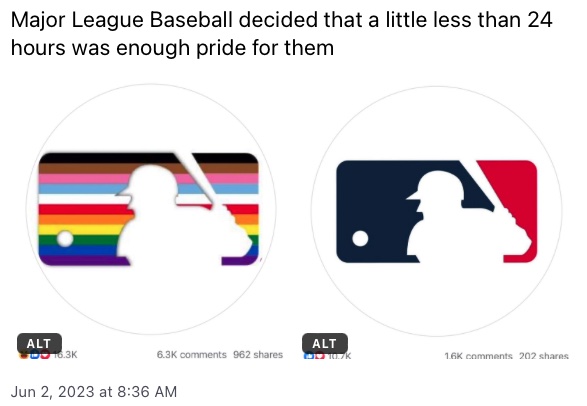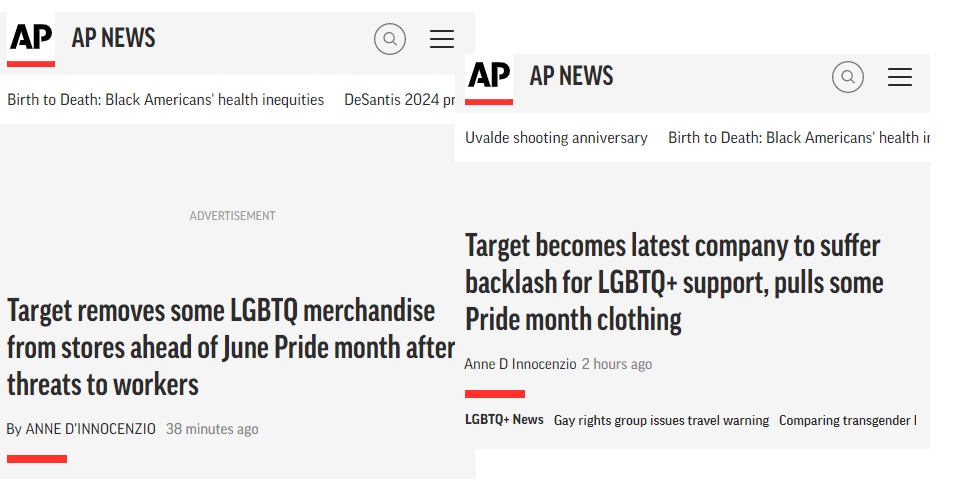On Corporate Pride
This year is marking a dramatic turn in Corporate Pride – the fairly cynical way large corporations try to cater to queer people for precisely 30 days only, and then mostly pretend we don’t exist. But over the last three years, as violent bigotry against queer folk has become a mainstream conservative belief, the cynicism of how Corporate Pride functions has been made starkly clear. Let’s explore a few examples.
In April, Budweiser engaged in perfectly normal, small scale, apolitical marketing to a new audience it wanted to expand into: queer people. I am talking, of course, about Dylan Mulvaney, and her posting a video of a single novelty can of beer and sipping some on camera. Mainstream conservative voices erupted in fury – I truly do not feel like linking to them, sorry – and barraged the beer company with not only filmed acts of vandalism and destruction on social media but bomb threats and personal threats of violence against employees. In response, the company apologized for marketing to trans people, issued a dumb camouflage can design, placed two executives on unpaid leave, and issued this statement:
“We have made some adjustments to streamline the structure of our marketing function to reduce layers so that our most senior marketers are more closely connected to every aspect of our brands’ activities… These steps will help us maintain focus on the things we do best: brewing great beer for all consumers, while always making a positive impact in our communities and on our country.”
The CEO of Anheuser-Busch also issued a press release where he said, “We never intended to be part of a discussion that divides people. We are in the business of bringing people together over a beer.”
If this seems like a weird response to an organized campaign of terror against a company, that’s because it is weird. Bud Light sales have been in a multiyear decline as consumer tastes change, and this has only accelerated it. People who are upset they acknowledged queer people stopped buying it, but so too did queer people who are upset they caved to the extremists. The company is clearly concerned about not ruffling too many feathers, but their effort to not pick sides wound up offending everyone. And in the mainstream press, which has intentionally downplayed the right wing violence, the coverage has focused on their cratered sales instead of the salient fact that this is a company being barraged by an organized campaign of terror.
To be precise: Dylan Mulvaney did nothing wrong, nor did Budweiser – despite the cries of “keeping politics out of beer,” the political behavior in this case is violent extremists going into a rage because queer people exist as a market. And yet.
When the LA Dodgers saw a tweet from Florida Senator Marco Rubio whining that their annual Pride night event included the Sisters of Perpetual Indulgence, they immediately disinvited the group. The Sisters have been around for 30 years, doing lifesaving activist work for HIV/AIDS patients during a time when most of America wished us queer folk dead (Melissa Wilcox, Professor and Holstein Family and Community Chair of Religious Studies at the University of California, Riverside, wrote an excellent history of the group that is worth reading). The objections to their inclusion, we are told, had nothing to do with queer people per se – even though, again, the Sisters have been doing charity work for our community for decades longer than Marco Rubio has been in the Senate. No, the approach Rubio and Dodgers pitcher Clayton Kershaw chose to oppose queer inclusion was because the Sisters mock the Catholic Church and lead to the “grooming” of children (a now-standard blood libel in conservative circles).
Neither Senator Rubio nor Clayton Kershaw have publicly condemned the Catholic Church for its decades of industrial scale child sexual abuse, which we continue to learn about in diocese after diocese after diocese – thousands of children sexually abused at church to silence from these people. No, the presence of queer activists mocking the child abusing church are the problem for these people. This is what the mainstream press present as “apolitical” views that huge brands are catering to.
LA Pride withdrew from the Dodgers Pride Night. Embarrassed they might host a Pride night with no Pride organizations, the Dodgers apologized and reinvited the Sisters, even offering them a civil duty award. Who cares? Just today, day two of Pride Month, the MLB decided to scrub its entire social media feed of any mention of Pride – but they kept the Pride merch store online, just in case anyone wanted to still give them money.

Then there’s Target. While international media has been clear that Target pulled rainbow merchandize from its shelves because of violent threats against stores and staff (including bomb threats against specific stores, not even corporate HQ), US media has been consistent in concealing the role of violence in prompting the company to fold to extremists. Of course the company, unable to even get a campaign of violence against its own people covered as the terrorism it is, caved to the terrorists.

The New York Times, ever eager to throw trans people under the bus in the name of neutrality with fascism, referred to this as criticism and backlash – but did not mention the violence.
The anti-queer fascists got the message loud and clear: they can engage in terrorism (that is usually how violence over politics is defined: the unlawful use of violence and intimidation, especially against civilians, in the pursuit of political aims) and the press simply won’t cover it. I had to dig to find coverage of similar campaigns starting up against LEGO and Chick-fil-A, because the major press organizations simply will not treat it as a story. Sit on that for a minute – most queer people still will not eat at Chick-fil-A because the owner is a proud homophobe who uses his winnings from the chain to lavishly fund legal pogroms against gay people, but because the company has a token DEI policy it is a (ahem) target.
The reason why I suspect all of these companies are caving to right wing terrorism – and why the mainstream press is just unable to report on it accurately – is that it is being driven by the same rich people who own their companies. The industrial anti-trans movement is funded by a bunch of billionaires who fund other Republican politicians. A press crippled by corporate consolidation both sides brain worms cannot report that honestly without admitting that one of the two parties they always triangulate against has gone mad with violent lust, and that they eagerly participate in partisan campaigns in order to remain technically “neutral.”
But this isn’t about the media, it is about Corporate Pride. Lots of queer people roll their eyes at the elaborate Pride displays companies put on each year. We all know they don’t really mean it, and that can be grating. At the same time, American society is defined by consumerism. Our social values, our religion, our politics – all of it is filtered through purchasing. That means Corporate Pride, however annoying, has real value as both symbolism and cash-driven behavior. That is why the fascist terrorists have targeted pride displays. It isn’t about a concern for children, no matter how many respectable figures try to say so – the intellectual leaders of this terrorist campaign are clear that their objection is to acknowledging the existence of queer people.
While I do not truly care about whether the Major League Baseball organization specifically has an authentic committment to LGBTQ equality – to say I am not a fan of baseball is an understatement – their decision to recognize whether or not we exist has enormous symbolic and political power in our society. Even in “safe” areas like my home state of Colorado, the nationwide campaign of terror against queer people has real, damaging effects on us. When I worked at a defense contractor in Virginia many years ago, and the single flyer posted in the break room celebrating Pride was vandalized – that communicated something specific to me, a reminder that my colleagues were prepared to harm me just for existing.
As dumb as Corporate Pride is, in American society Corporate Pride is a milestone for how society views us: are we a valid part of the culture and therefore safe for marketing? Objectively, we are: polling consistently shows strong acceptance for pride marketing and queer existence in ads and other forms of public communication. We are not controversial! But as the shrieks for violence against us remains in the public sphere, legitimized by a wave of bigoted laws in state legislatures and normalized by media industry completely unmoored from its ethical grounding, it is clear that majority support is not enough. Without some other powerful institution stepping in to defend us, there is no countervailing force against the Republican-led pogrom against queer people. Corporations are, however dismaying it may be, one of those powerful organizations. When they cave to a small number of violent extremists and choose to erase us through some opaque market calculation, it is a stab in the back.
So! Corporate Pride is dumb and cynical. But it also is meaningful. And that meaning is changing: boardrooms are deciding that queer people are not worth the hassle of violent threats, however small the group, if other institutions in American society won’t also step up. At the end of the day, corporations are cowards: they don’t want to risk anything that may interrupt the in-flow of money.
But in trying to thread this needle, they are bumping up against the same structural transformation of post-Trump American society that the national media has failed to understand: there is no middle ground on queer rights anymore. The people applauding a CPAC speaker saying “transgenderism must be eradicated” are not going to accept any existence of queer people. They’re pretty clear about this! Corporations have to make a choice. And, to my deep dismay, this year they are choosing to cater to the tiny minority of violent extremists instead of the larger market of queer folk who just want to live.
And that is truly depressing.